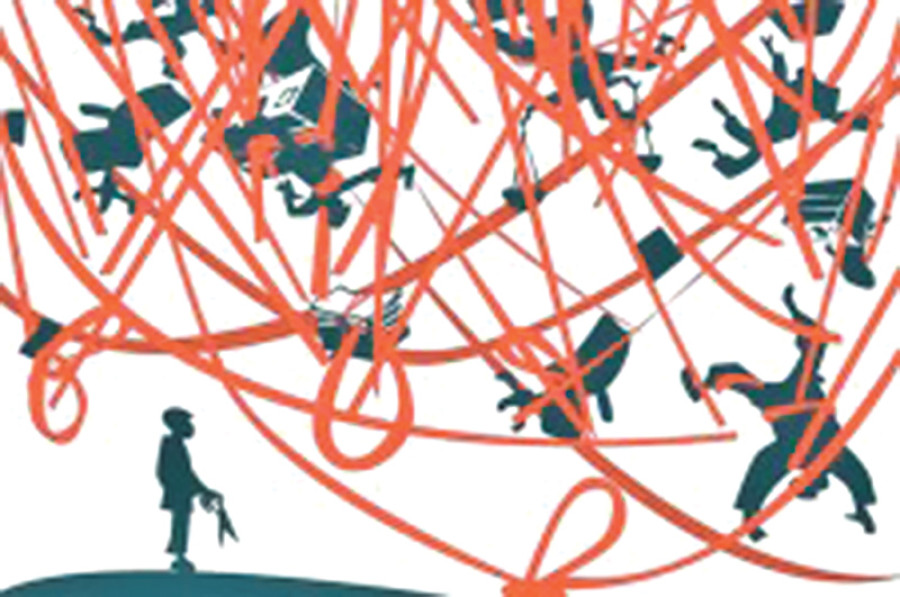Opinion
Accountability crisis
Accountability is fundamental to a federal democratic government, and it cannot be compromised as ministries and the bureaucracy are answerable for their actions.
Niranjan Mani Dixit
Accountability is fundamental to a federal democratic government, and it cannot be compromised as ministries and the bureaucracy are answerable for their actions. The national budget largely comes from taxpayer money. Every bit of bread purchased with hard-earned money is taxed in various forms. Inflation due to uncontrolled irregularities and cartels has compelled people to pay more for goods and services. People are deprived of their right to service delivery as the government is incapable of spending the allocated budget money, which is unconstitutional, undemocratic and even unpatriotic.
It is shocking that capital expenditure was recorded at a mere 11.3 percent of the total allocation of Rs311.95 billion as of the first half of fiscal 2016-17. The Ministry of Physical Infrastructure and Transport was inexplicably not represented at the mid-term review of the budget, even though it had the largest budget allocation of Rs72.68 billion and it could spend only 17 percent of it. Slothful capital spending by a number of ministries is depressing. In a bitter experience, about 70 percent of the capital expenditure is usurped by the Kathmandu Valley each year at the cost of other districts in dire need, thus widening regional disparities.
Swollen budget surplus
If current spending trends were to continue, the country will have a swollen budget surplus of around Rs300 billion by the end of the fiscal year, as per the National Planning Commission.Considering the lack of spending and billions in taxpayer money lying idle in the government treasury, the House of Representatives should be sympathetic to the people and demand that the tax rate be slashed and the unspent tax money be refunded until politics stabilises and the government’s spending capacity improves.
In order to translate budgetmoney into tangible activities and results, the government has a full-blown workforce of 27 ministries, 24 ministers,14 state ministers, 49 secretaries and 89,000 civil servants. Moreover, there are 601 Members of Parliament and various constitutional bodies including the National Planning Commission. There are also 95,000 Nepal Army personnel, 31,000 Armed Police Force personnel and 72,000 Nepal Police personnel to enforce government laws. The massive human resources are all meant for the wellbeing of the Nepali people and the development of Nepal.
Government spending on salaries and benefits has jumped 26.9 percent to Rs132.3 billion per annum, which accounts for 12.6 percent of the annual national budget. Likewise, the salaries and perks of 601 Members of Parliament have been hiked tremendously. All this is paid from the Rs565.9 billion targeted to be received through tax and non-tax revenue. Each year, the government has been recklessly and exorbitantly increasing tax rates and strangling the people and the private sector so that it can create a populist national budget andstay in power longer. This is worrisome.
Hawk-like vigilance
In order to right this situation, those in leadership roles need to possess micromanaging qualities so that they can oversee spending with hawk-like vigilance. However, we have been seeing a hands-off management stylewhere managers do not, or are not able to, take appropriate and timely action. This results in a decline in productivity and poor and inadequate service delivery.
Ministers and secretaries, who are in the driving seat, should closely monitor the spending patterns of their ministries. The finance minister and his team, along with the National Planning Commission, should detect and report deviations in the spending of the budget allocation right away instead of waiting for the midterm or final review. By the time the midterm or final review is held and the unspent funding is noticed, it will be too late to take corrective action.
Here, the role of the parliamentary committees is vital to ensure checks and balances so that there is consistent spending for a timely, quantitative and qualitative output for the benefit of the people. The prime minister should not tolerate lack of budgetary and fiscal discipline. Inefficiency, kickbacks and corruption haveput large projects in limbo. The age-old unhealthy practice of spending the budget amount haphazardly towards the end of the fiscal year at the cost of the quality of work should be eliminated.
Large-scale lack of spending is harmful. Low capital expenditure has also been blamed on ministries wasting time in political and social engineering and political parties transforming into a Kathmandu-centric political industry. At the same time, there exists a highly centralised top-down remote control management.
Unwarranted intervention by political leaders and parties in the bureaucracy, trade and commerce are other problems. In a democracy, passing the buck and exchanging accusations do not help resolve the country’s problems. In order to ensure accountability and speed updevelopment, the government and political parties should hold free, fair and regular elections from the grassroots to the national levels. This will allow fresh and capable candidates to move into leadership roles.
Dixit is an expert in integrated development issues




 12.99°C Kathmandu
12.99°C Kathmandu










